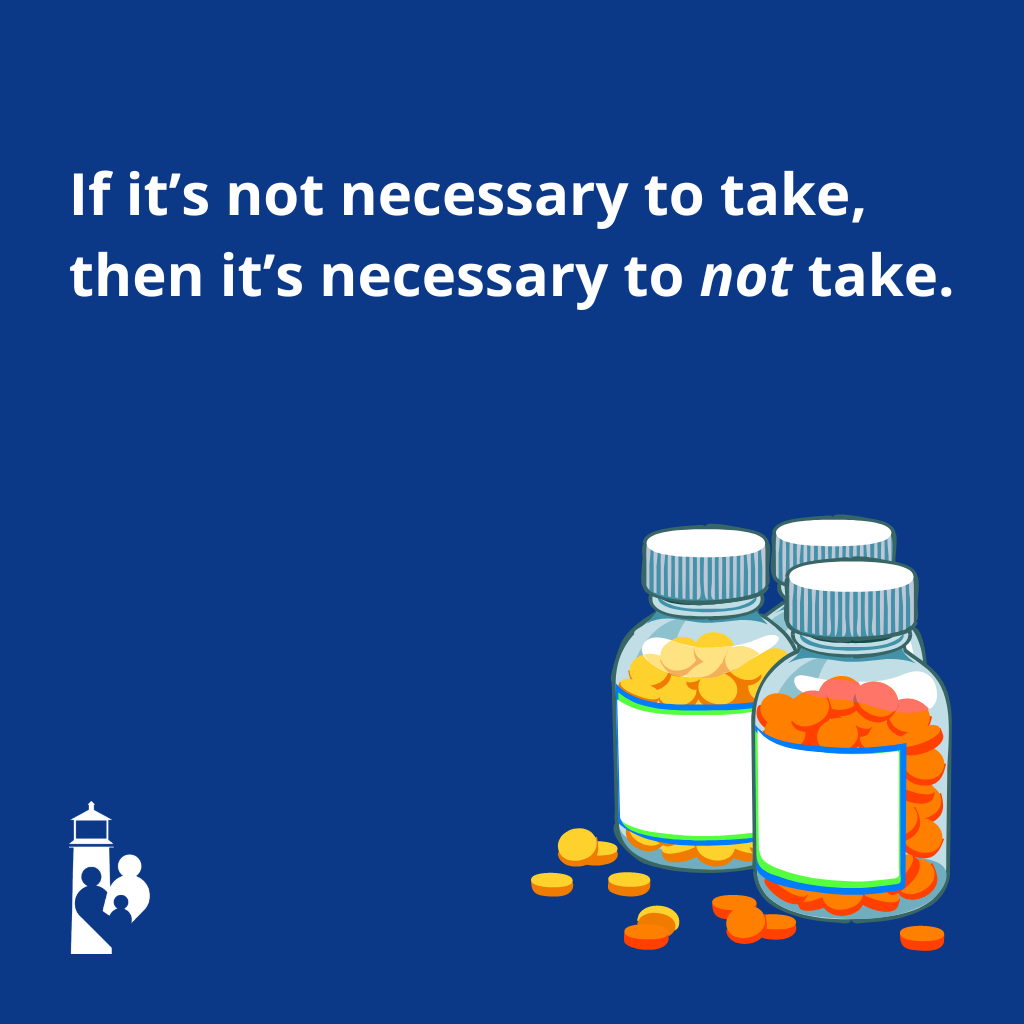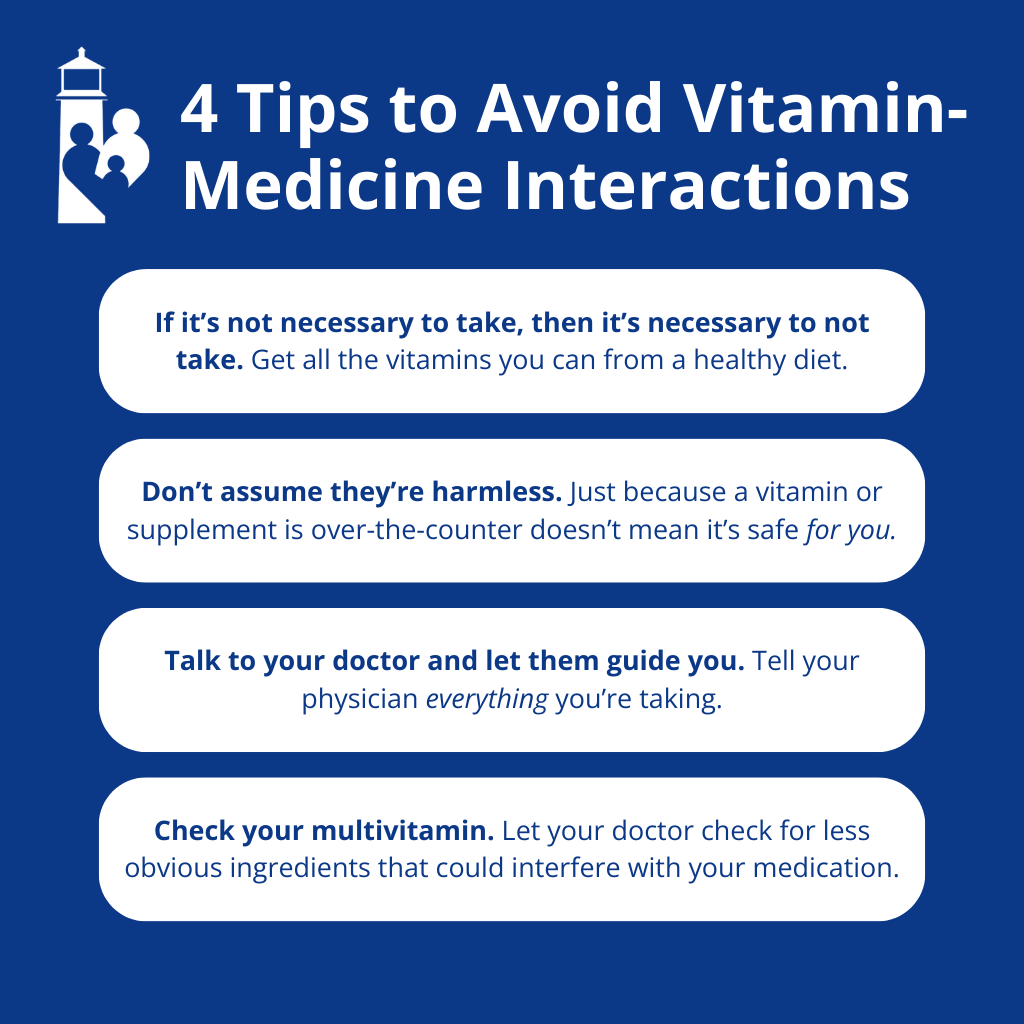
When we take vitamins or supplements, it’s because we care about our health. We want to do everything we can to support a healthy life. But sometimes our efforts can work at cross purposes without our knowledge.
It’s helpful to remember that vitamins and supplements aren’t so different from pharmaceuticals in that they’re external substances we put into our bodies to accomplish an outcome.
And, like pharmaceuticals, vitamins and supplements can interact with the other substances we put into our bodies. Some of these interactions are innocuous or even helpful, but sometimes the interactions can be downright dangerous.
Can you take medicine and vitamins together? In some cases, yes. But it’s genuinely possible to inadvertently harm yourself with interactions or redundancies between a supplement and a pharmaceutical.
Let’s look at the risks and how to safely take medicine and vitamins together.
Help vs. Harm: Are Vitamins and Supplements Necessary?
Since vitamins and supplements generally derive from food sources and are available over the counter, they seem quite innocuous. However, as we know, looks can be deceiving.
The old dictum Let food be thy medicine isn’t outdated — the best way to get our vitamins and minerals is still through food. In foods, our bodies receive intricate, carefully balanced deliveries of vitamins, minerals, fiber, and more. And because we must actually chew and digest foods, we’re unlikely to overindulge in a single nutrient to the point of harm.
We have no such resistance, however, when it comes to vitamins and supplements delivered in pills, powders, or tinctures.
It’s true that you certainly can overdose on beta-carotene by eating a pound of carrots every day, but it wouldn’t be easy. What’s far easier is to overdose on beta-carotene in the form of a few pills a day, every day.
So, should we just avoid vitamins and supplements altogether? Well, let’s not get carried away.
Ideally, we’d get all our required nutrition from food, and supplementation wouldn’t be necessary. But, as I’ve written previously, given the combination of modern food and farming practices and the standard American diet, it’s no wonder many U.S. citizens are nutrient-deprived. This is one of the reasons supplementation became popular in the first place.
The rule I abide by in our modern reality is this: If it’s not necessary to take, then it’s necessary to not take. Yes, this rule applies to pharmaceuticals, but it applies quite firmly to supplements as well.
If you’re going to take vitamins or supplements, you need to know what, specifically, you’re trying to get out of them. On top of that, you must let your physician know everything you’re taking so they can help you avoid problematic interactions.

Can You Take Medicine and Vitamins Together?
As you might have surmised, the answer to Can you take medicine and vitamins/supplements together is… it depends. The way to ensure you take only what will help and not harm is to share what you take — prescriptions, over-the-counter medications, vitamins, etc. — with your physician.
Your physician can advise you on which supplements could cause harm and which could help (yes, help!) support a course of medication.
When Vitamins Help
In some cases, vitamins can work alongside medicines to achieve an outcome. In other cases, they can support the body as it deals with the side effects of necessary medications. For instance:
- People with urinary tract infections might take vitamin C to acidify their urine and help fight the infection.
- People using lubricating eye drops for dry eyes may find that taking fish oils and vitamin E orally helps maintain moisture.
- People taking methotrexate for cancer or autoimmune conditions require folic acid/folate supplementation, since the drug results in deficiency.
When Vitamins Harm
Vitamins and supplements may be available without a prescription, but they still create an effect in the body that can be unsafe when combined with other pills. For example:
- Fish oils don’t mix well with blood thinners; because they also perform a “blood thinning” function, they can lead to excessive bruising.
- St. John’s Wort works similarly to many antidepressants; a combination of the two can lead to a potentially fatal condition called serotonin syndrome.
- Iron supplements can interfere with the absorption of osteoporosis medications, thyroid medications, and antibiotics, making those medications less effective.
- Vitamin K, which is common in multivitamins, can interfere with and even neutralize the benefit of crucial blood thinners.
- Niacin (a B-vitamin) can cause muscle pain in people on statins.

Conclusion: Can You Take Medicine and Vitamins Together?
Supplementing your diet with vitamins or minerals may or may not be necessary, depending upon your specific picture of health. Here are some quick tips to help you make safe decisions:
-
- If it’s not necessary to take, then it’s necessary to not take. Get all the vitamins you can from a balanced, whole food diet.
- Don’t assume they’re harmless. Just because a vitamin or supplement is over-the-counter doesn’t mean it’s safe for you — especially if you’re taking any other medications or supplements.
- Talk to your doctor and let them guide you. Tell your physician everything you’re taking. Not only do they have expertise here, but they also have access to resources, like the Epocrates database, to quickly check the safety of potential medicine and vitamin/supplement interactions.
- Check your multivitamin. While I advocate for taking a high-quality multivitamin, you do have to exercise some caution with that long list of ingredients. Because your multivitamin could contain a vitamin that interferes with or duplicates the effects of your medication, it’s important to bring the actual bottle to your doctor. This way, your physician can see that eye-crossing ingredient list for themselves and evaluate it according to their expertise (especially important since many nutrients go by multiple names!).
By following these simple rules, you can guard your health from unintended interactions AND get the best out of your medicines and vitamins.

Dr. David Rosenberg
Dr. Rosenberg is a board-certified Family Physician. He received his medical degree from the University of Miami in 1988 and completed his residency in Family Medicine at The Washington Hospital in Washington, Pennsylvania in 1991. After practicing Emergency Medicine at Palm Beach Gardens Medical Center for two years, he started private practice in Jupiter, in 1993. He is an avid baseball fan and Beatles fanatic, since he was 8 years old. He has been married to his wife, Mary, since 1985 and has three grown children.
David completed additional studies at Mercer University, Macon, Georgia and obtained a BS in Chemistry in 1983.
“My interests include tennis, snow skiing, Pilates and self-development.”
